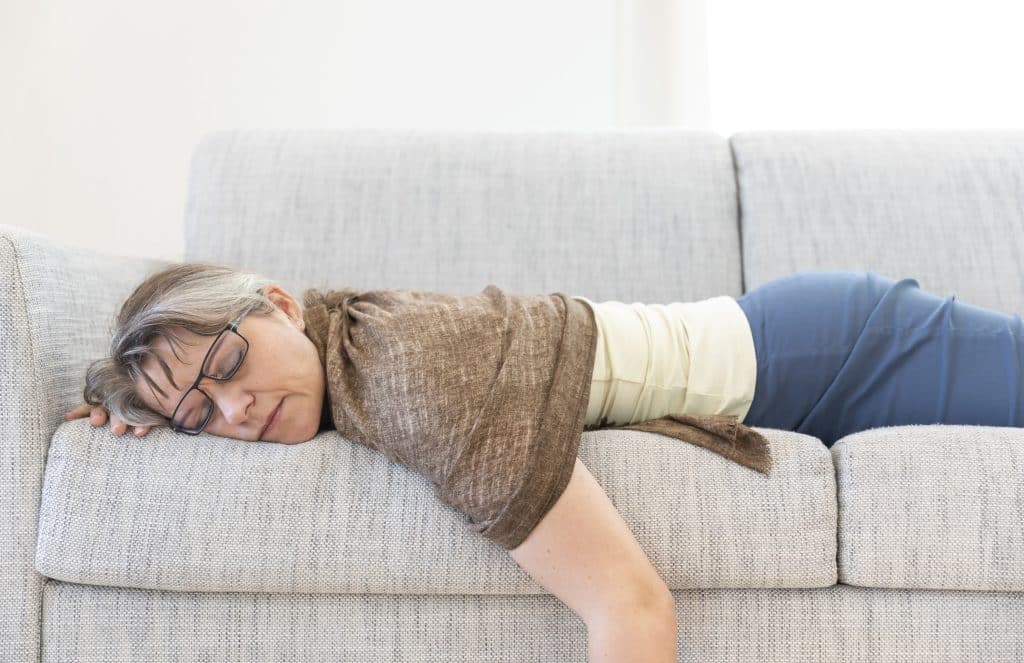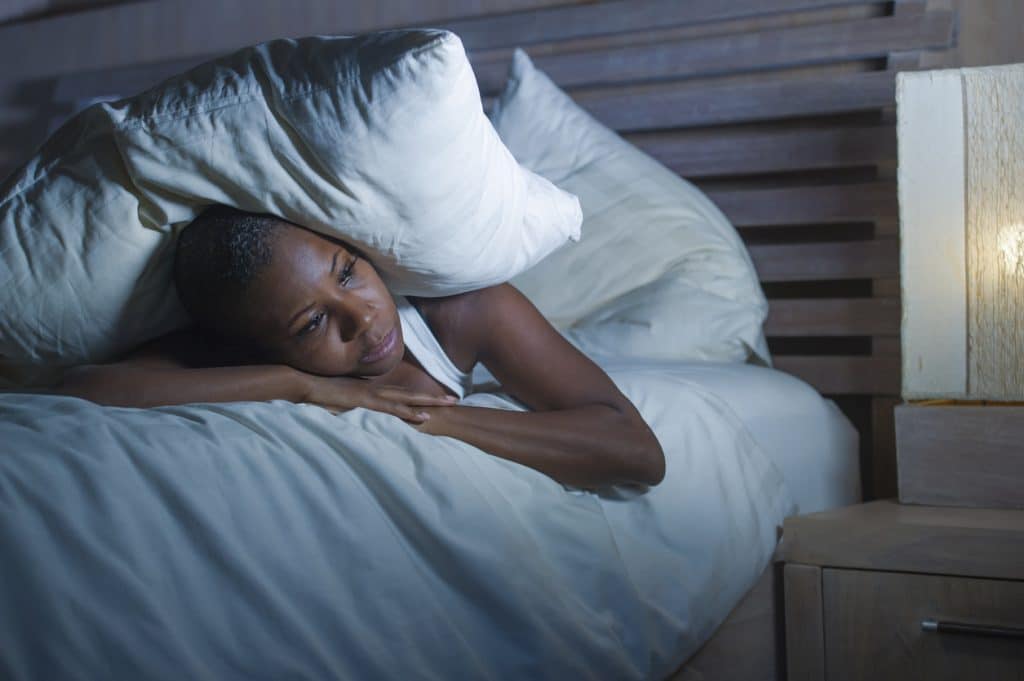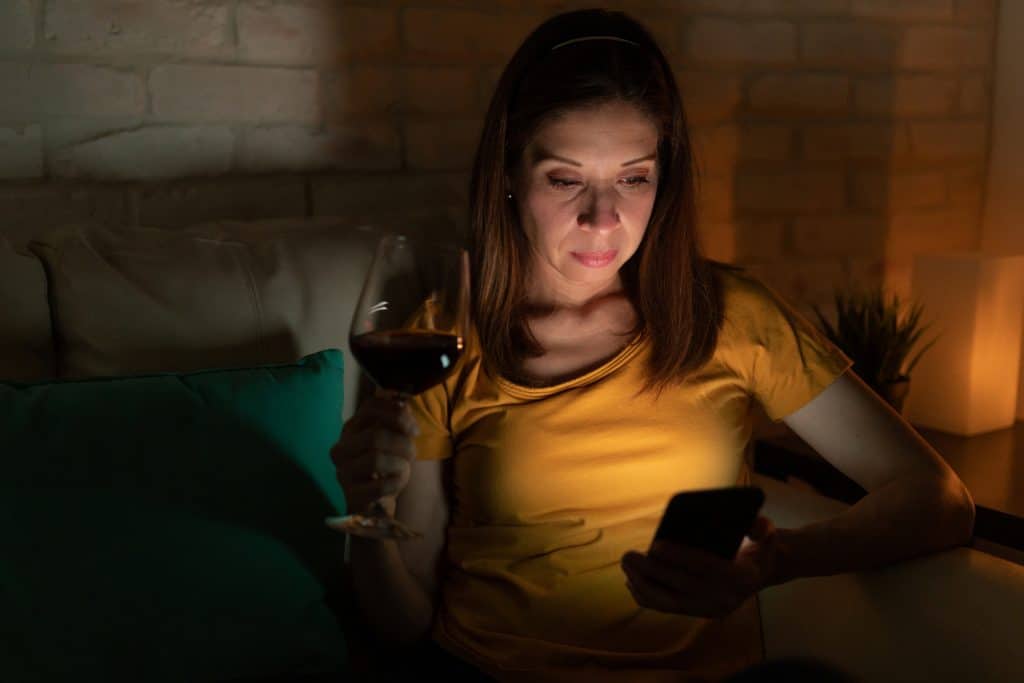Better Sleep is the one factor that probably has the greatest effect on our overall health. If you are not getting enough sleep or your sleep is poor, everything else will pale in comparison. You may feel okay but all of the research says you are probably not.

And also keep in mind that the quality of your sleep will most likely have a huge impact on your ability to lose weight. Poor sleep can increase your appetite and adversely affect blood sugar control. (1,2,3,4)
The general consensus out there in the world of sleep research is that humans need at least 7 to 9 hours of sleep each night to prevent long-term detrimental health consequences. The National Sleep Foundation recommends 7-9 hours of sleep for people ages 18-64 and 7-8 hours for those over 64. (5)
Once you go under 7 hours a night you are increasing your risk for diseases such as diabetes, obesity, cancer, depression, cardiovascular disease, dementia, and for dying younger. (6)
Yes, there is room for some biochemical individuality. Data shows that there are several genetic factors that influence how much sleep we need. (7) And there is even more variability around WHEN you sleep. Some people are night owls and others are morning birds and that seems to be fine from a health perspective. (8)
Unfortunately, our society favors early risers so if you are a night owl you may be chronically sleep-deprived from having to conform.
Most people who lack sleep fall into one of two categories: those who choose to sleep less OR those who want more sleep but struggle with some form of sleep disruption.
If you are not getting enough sleep or you sleep too much solely due to lifestyle choices, forget about working on your diet and exercise. Set those aside for now and work on getting more sleep.
If you do have trouble sleeping that is another story altogether but it still needs to be addressed.

If you struggle to fall or stay asleep, below are 12 suggestions on how to improve your sleep. I’m sorry there is no easy solution but it is of paramount importance that you do these things before you seek out supplements or medications to help you fall or stay asleep.
- LIGHT THERAPY: Improve your body’s circadian regulation with light therapy (9,10). This can be done by getting several hours of bright light exposure during the day. Depending on what type of sleep issues you have, the time of day that you take light therapy may differ. This can be achieved through natural sunlight or daylight exposure for 30 minutes or more, or if this is not possible, you may want to invest in a lightbox for indoor light therapy. I have found that one of the most powerful lifestyle recommendations is to get a walk in nature daily. This provides you with a nice amount of light exposure, the calming effects of nature, and some physical activity. Many report that it also increases creative thinking. Many, many of our clients have found that a morning walk has improved their sleep dramatically.
- TEMPERATURE: Sleeping in a cooler room may help improve your sleep. I suggest starting with 68-70 degrees F and if you are inclined to, try cooler temperatures around 65 degrees F. There have been several small clinical trials showing that heat can disrupt sleep so I would definitely try to avoid sleeping in a hot room as much as possible. Otherwise, lowering the room temperature, like all other sleep interventions, will come down to individual needs. (11,12,13)
- MOVEMENT: Light to moderate exercise may improve sleep but be sure to avoid vigorous or intense exercise like high-intensity interval training one hour or less before bed. (14) Also, if sleep is poor, I strongly recommend that you consider increasing your physical activity during the day or doing some light walking or stretching in the evening.
- HORMONES: Work with a health professional to see if your hormones are playing a role in your sleep disruption. This is very common, especially during the perimenopause years (ranging from the mid-30s to mid-50s) and after menopause. Estrogen and progesterone can have a profound effect on your sleep. As can blood sugar dysregulation. Working with a health professional to check on these factors can make a world of a difference!
- NAPPING: You may be wondering if it’s okay to nap. We do need more research in the area but it looks like a nap does not adversely affect nighttime sleep as long as it’s a short one. Napping has many benefits. If you aim to keep your total sleep time in a 24-hour period to around 8 hours it doesn’t look like it will negatively impact your sleep at night. If you only slept 6 hours during the night a 20-minute nap will most likely be beneficial for you. Once you start going into longer naps then it may disrupt your sleep at night. The research is not extensive in this area so I suggest experimenting but do try to keep your total sleep time no less than 7 hours and no more than 9 hours in any given 24-hour period. (15)
- CAFFEINE: Avoid consuming any caffeine at least 3-6 hours before bedtime. The evidence varies with this so it really comes down to the individual. I suggest trying at least 6 hours before bedtime first to see how well it improves your sleep and then experimenting with different times from there if needed. (16)
- BLUE LIGHT: Light does affect your ability to sleep. Too much light at night can suppress melatonin. So try to reduce light exposure close to bedtime and sleep in a blackout dark room (17)
- YOUR BED: Make sure your bed is comfortable and does not cause any additional discomfort
- SLEEP HABITS: If you have been in bed for 20 minutes or more and you cannot fall asleep, get up and meditate or read a book or do some other activity that will distract your mind or help you get sleepy.
- MEDITATION: Consider incorporating several meditation sessions into your daily schedule. You can start with a 5-minute meditation once a day, develop that as a simple habit, and then slowly build on that. This can reduce your stress response, calm the mind, give you a feeling of control over your life, and ultimately it can potentially improve your sleep!
- BREATHWORK: There are many different breathing styles out there. This article covers some of them. Deliberate breathing exercises can calm your nervous system and help you to relax (18,19), which could potentially lead to more ease with falling asleep.
- GI ISSUES: For people with GERD or reflux, eating a LARGE meal before bed can worsen the condition and it may disrupt sleep. (20) So if that’s you, try finishing your last meal of the day at least 3 hours before bed. If you get hungry closer to bedtime you may want to consider a small snack after dinner but not too close to bedtime.
Once you have tried those things and really tried them, not just for a few days but for a few weeks minimum, if you are still struggling then you can consider taking some supplements. But you’ll need to work with a healthcare provider that is well-versed in helping with sleep through natural substances and strategies. Any doctor can prescribe a sleep medication but it will usually not address the underlying cause of the sleep disturbance.
You will need to listen to your doctor’s advice about when sleep medications become a necessity but I strongly urge you to work with a medical doctor that is aware of all of the current research surrounding sleep (aka sleep specialist MD). It could be that a simple supplement will round off all the other things you are doing to give you a nice night’s sleep.
If it is medically appropriate, I urge you to avoid taking a sleeping pill before exploring all other options and solutions. Drugs that induce sleep are sedatives (21), most of them are addictive (22) and they do not provide the same quality of sleep you would get naturally due to the potential detrimental effect on sleep stages. (23)
Of course, there are times when it is medically necessary to take sleep medications but it should not be the first, but rather the last, thing considered. And keep in mind that anything I say here does not take the place of your personal medical recommendations from a healthcare professional.
Please also keep in mind that many people are getting poor sleep and they are not even aware of it. Sleep Apnea and Airway-Centered Disorder (ACD) can cause Sleep-Disordered Breathing, which translates to poor breathing and therefore multiple wakings in a night. Some clients I have worked with have been waking 10s or even over 100s of times in a night and were not even aware of it. If you wake up tired or you have chronic fatigue I strongly urge you to do a sleep study.
Some people are deliberately choosing to shortchange their sleep. If that is you, then I highly recommend you consider why that is.

Often people neglect sleep because they feel like they don’t have enough “me” time, downtime, or time with loved ones. Many of these people are “night owls” and just enjoy the nighttime hours. Those people may choose to stay up late and watch TV or chat with their spouse just to revel in the quiet dark hours.
Some people may get up early to meditate or exercise because they have so little time to do so (those are not night owls).
If you can relate to compromising sleep deliberately due to your lifestyle, perhaps it’s time to ask if you are just doing too much or if you need to rethink your lifestyle.
It is crucial for your long-term health that you have time to practice self-care, spend time with loved ones, or just relax on the couch. And your sleep should not suffer so that you can afford the time to do those things.
There are some circumstances where the person feels stuck in their current life choices (for example, working for a company that requires you to work 16-hour days).
But most of us do have quite a bit of choice in how we spend our days.
You do not HAVE TO volunteer for your church. You are not required to have a perfectly clean house. Your children can probably do more for themselves.
It’s up to you to look at your life and set the boundaries necessary so that you can give yourself 8-9 hours of “sleep opportunity” AND have time to get R&R, some movement, and time with your loved ones.
Whether you are deliberately getting poor sleep or you suffer from chronic sleep disruption, the key takeaway here is that poor sleep does affect your long-term health and your ability to lose weight.
It could be the number one factor that is slowing down the weight loss process for you! This is crucial to understand because over the years I have seen many women struggling to get the perfect diet or exercising like crazy and they still struggle to lose weight. Then we improve their sleep, suddenly everything becomes much easier! Imagine that?!
Our programs focus on 5 major aspects of health including sleep, physical activity, stress management, mindset, and nutrition. If you are looking to lose weight in a healthy and sustainable way or you are seeking guidance on healthy aging, our programs might be for you.
If you’re just not sure where to start, we recommend trying out a one-off consultation. From this session, you will get one to two doable action steps that will move the dial for you. To learn more about these sessions, please click the link below.
Read More Blogs about Self Love!
REFERENCES
- Van Cauter, Eve, Ulf Holmbäck, Kristen Knutson, Rachel Leproult, Annette Miller, Arlet Nedeltcheva, Silvana Pannain, Plamen Penev, Esra Tasali, and Karine Spiegel. “Impact of sleep and sleep loss on neuroendocrine and metabolic function.” Hormone Research in Paediatrics 67, no. Suppl. 1 (2007): 2-9.
- Brondel, Laurent, Michael A. Romer, Pauline M. Nougues, Peio Touyarou, and Damien Davenne. “Acute partial sleep deprivation increases food intake in healthy men.” The American journal of clinical nutrition 91, no. 6 (2010): 1550-1559.
- Greer, Stephanie M., Andrea N. Goldstein, and Matthew P. Walker. “The impact of sleep deprivation on food desire in the human brain.” Nature communications 4, no. 1 (2013): 1-7.
- Donga, Esther, Marieke van Dijk, J. Gert van Dijk, Nienke R. Biermasz, Gert-Jan Lammers, Klaas W. van Kralingen, Eleonara PM Corssmit, and Johannes A. Romijn. “A single night of partial sleep deprivation induces insulin resistance in multiple metabolic pathways in healthy subjects.” The Journal of Clinical Endocrinology & Metabolism 95, no. 6 (2010): 2963-2968.
- National Sleep Foundation https://www.sleepfoundation.org/articles/how-much-sleep-do-we-really-need.
- Consensus Conference Panel, Watson NF, Badr MS, Belenky G, Bliwise DL, Buxton OM, Buysse D, Dinges DF, Gangwisch J, Grandner MA, Kushida C, Malhotra RK, Martin JL, Patel SR, Quan SF, Tasali E. Joint Consensus Statement of the American Academy of Sleep Medicine and Sleep Research Society on the Recommended Amount of Sleep for a Healthy Adult: Methodology and Discussion. Sleep. 2015 Aug 1;38(8):1161-83. doi: 10.5665/sleep.4886. PMID: 26194576; PMCID: PMC4507722.
- Partinen M, Kaprio J, Koskenvuo M, Putkonen P, Langinvainio H. Genetic and environmental determination of human sleep. Sleep. 1983;6(3):179-85. doi: 10.1093/sleep/6.3.179. PMID: 6684786.
- Goel N. Genetics of Sleep Timing, Duration, and Homeostasis in Humans. Sleep Med Clin. 2011;6(2):171‐182. doi:10.1016/j.jsmc.2011.03.004
- Faulkner SM, Bee PE, Meyer N, Dijk DJ, Drake RJ. Light therapies to improve sleep in intrinsic circadian rhythm sleep disorders and neuro-psychiatric illness: A systematic review and meta-analysis. Sleep Med Rev. 2019 Aug;46:108-123. doi: 10.1016/j.smrv.2019.04.012. Epub 2019 Apr 30. PMID: 31108433.
- Campbell SS, Dawson D, Anderson MW. Alleviation of sleep maintenance insomnia with timed exposure to bright light. J Am Geriatr Soc. 1993 Aug;41(8):829-36. doi: 10.1111/j.1532-5415.1993.tb06179.x. PMID: 8340561.
- Di Nisi J, Ehrhart J, Galeou M, Libert JP. Influence of repeated passive body heating on subsequent night sleep in humans. Eur J Appl Physiol Occup Physiol. 1989;59(1-2):138-45. doi: 10.1007/BF02396592. PMID: 2583142.
- Libert JP, Di Nisi J, Fukuda H, Muzet A, Ehrhart J, Amoros C. Effect of continuous heat exposure on sleep stages in humans. Sleep. 1988 Apr;11(2):195-209. doi: 10.1093/sleep/11.2.195. PMID: 3381060.
- Okamoto-Mizuno K, Tsuzuki K, Mizuno K. Effects of mild heat exposure on sleep stages and body temperature in older men. Int J Biometeorol. 2004 Sep;49(1):32-6. doi: 10.1007/s00484-004-0209-3. Epub 2004 Jun 2. PMID: 15173935.
- Stutz J, Eiholzer R, Spengler CM. Effects of Evening Exercise on Sleep in Healthy Participants: A Systematic Review and Meta-Analysis. Sports Med. 2019;49(2):269‐287. doi:10.1007/s40279-018-1015-0
- Campbell, S.S., Murphy, P.J. and Stauble, T.N. (2005), Effects of a Nap on Nighttime Sleep and Waking Function in Older Subjects. Journal of the American Geriatrics Society, 53: 48-53.
- Drake C, Roehrs T, Shambroom J, Roth T. Caffeine effects on sleep taken 0, 3, or 6 hours before going to bed. J Clin Sleep Med. 2013 Nov 15;9(11):1195-200. doi: 10.5664/jcsm.3170. PMID: 24235903; PMCID: PMC3805807.
- Shechter A, Boivin DB. Sleep, Hormones, and Circadian Rhythms throughout the Menstrual Cycle in Healthy Women and Women with Premenstrual Dysphoric Disorder. Int J Endocrinol. 2010;2010:259345.
- Pramanik T, Pudasaini B, Prajapati R. Immediate effect of a slow pace breathing exercise Bhramari pranayama on blood pressure and heart rate. Nepal Med Coll J. 2010 Sep;12(3):154-7. PMID: 21446363.
- Sharma VK, Trakroo M, Subramaniam V, Rajajeyakumar M, Bhavanani AB, Sahai A. Effect of fast and slow pranayama on perceived stress and cardiovascular parameters in young health-care students. Int J Yoga. 2013 Jul;6(2):104-10. doi: 10.4103/0973-6131.113400. PMID: 23930028; PMCID: PMC3734635.
- Fujiwara Y, Machida A, Watanabe Y, et al. Association between dinner-to-bed time and gastro-esophageal reflux disease. Am J Gastroenterol. 2005;100(12):2633‐2636. doi:10.1111/j.1572-0241.2005.00354.x
- Cleveland Clinic “Sleep Pills“
- Mayo Clinic “Prescription sleeping pills: what’s right for you?“
- Pagel JF, Parnes BL. Medications for the Treatment of Sleep Disorders: An Overview. Prim Care Companion J Clin Psychiatry. 2001;3(3):118‐125. doi:10.4088/pcc.v03n0303
